More past winners
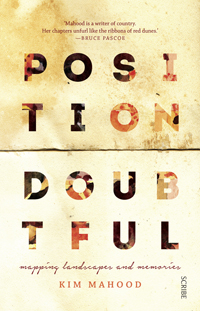
2013
Kim Mahood for Position Doubtful: mapping landscapes and memories
“Imagine the document you have before you is not a book but a map. It is well-used, creased, and folded, so that when you open it, no matter how carefully, something tears and a line that is neither latitude nor longitude opens in the hidden geography of the place you are about to enter.”
This book is a beautiful and intense exploration of friendships, landscape, and homecoming. Written with great energy and humour, Position Doubtful offers a unique portrait of the complexities of black and white relations in contemporary Australia.
Kim Mahood is a writer and artist whose work explores the complex relationship between memory, identity, community and land. Each year Mahood spends several months in the desert working with the Walmajarri people on mapping projects; a practice that informs her creative work. Position Doubtful follows in the wake of Mahood’s memoir Craft for a Dry Lake (Anchor, 2000) – an account of her return to the spaces of the Australian outback where she grew up – which was awarded the NSW Premier’s Award and won The Age non-fiction Book of the Year. Mahood is a regular contributor to the Griffith Review and has also had work published in Meanjin and Island magazine. An extract from Position Doubtful titled “The River” was recently published in Meanjin (Winter vol. 72 no. 2 2013) and was selected for inclusion in Best Australian Essays 2013. Mahood has also had multiple other pieces published in the Best Australian Essays collections including “Blow-ins on the Cold Desert Wind” (2007), “Kartiya are Like Toyotas: White Workers on Australia’s Cultural Frontier” (2012), and “Dancing the Country” (2000), and her short story “The Shark” was published in Best Australian Short Stories (2001). She was recently shortlisted for the 2013 Elizabeth Jolley Short Story Prize for her story “The Accident”. In their report on Position Doubtful the judges stated that “Mahood’s study of her experiences working with Aboriginal communities in mapping the remote desert country where she grew up was exceptional in the precision and perception of its writing.” They also noted that “Her clear-sighted journey across the cultural fault-lines of her past also resonates with a contemporary political edge, deepening our understandings of identity and the human condition.”
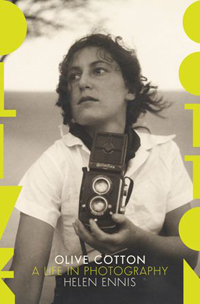
2012
Helen Ennis for her biography Olive Cotton
A landmark biography of a singular and important Australian photographer, Olive Cotton, by an award-winning writer – beautifully written and deeply moving.
Olive Cotton was one of Australia’s pioneering modernist photographers, whose significant talent was recognised as equal to her first husband, the famous photographer Max Dupain... Intriguing, moving and powerful, this is Olive’s story, but it is also a compelling story of women and creativity – and about what it means for an artist to try to balance the competing demands of their art, work, marriage, children and family.
Variously described as a “photographic historian”, a “distinguished scholar” and a “freelance curator”, Helen Ennis has demonstrated not only a passion for photography but also a fervent curiosity for the lives of the artists whose work she has curated. From 1985-1992, Ennis worked as the Curator of International and Australian photography at the National Gallery of Australia. Currently, she occupies the role of Associate Professor, Head of Art Theory and Convenor of the Graduate Research program at the ANU School of Art. The judges said that Ennis’ proposed biography “of the renowned Australian photographer Olive Cotton is an exciting project which will explore the life and work of one of few women working in the field in the early to mid-twentieth century. Her draft chapters are extremely engaging and a joy to read.” As part of her research into the life of Olive Cotton, Ennis published a long essay in Australian Book Review (July-August no. 353, 2013) titled “Olive Cotton: The Modernist Photographer at Spring Forest.” In a reflective article “The Space of Biography: Writing on Olive Cotton” published in Meanjin, Ennis shares a tantalising vision of her work with the reader: “I can see how the words appear on the papery pages, open with space around them. The font is classic, Bodoni perhaps, or Garamond. Reproductions of Olive’s photographs are full page and commanding. The book itself is a beautiful object, its weight just right for hands to hold on the couch or in bed. A book for pleasure, not for duty” (Spring vol. 71 no. 3 2012). Ennis has previously written and published two other biographies: the first titled Wolfgang Sievers (National Library of Australia, 2011) and the second Margaret Michaelis: Love, Loss and Photography (National Gallery of Australia, 2005). For Wolfgang Sievers she won a Victorian Premier’s Literary Award – The Nettie Palmer Prize for Non-Fiction, and was nominated, and made the shortlist for, the Australian Capital Territory Book of the Year award.
2011
Robyn Davidson for Self Portrait with Imaginary Mother
Davidson is a regular contributor of essays and autobiographical pieces for publications such as The Weekend Australian Magazine, The Monthly, The Times Literary Supplement and Griffith Review. She has published two other books: the novel Ancestors (Random House, 1989) and the travel memoir Desert Places (Penguin, 1996), and edited the 2009 collection of Best Australian Essays (Black Inc.) and The Picador Book of Journeys (Picador, 2001). Davidson also wrote the celebrated travel narrative Tracks (Jonathan Cape, 1980) about her nine month, 2,700 kilometre trek across the Australian outback from Alice Springs to the Indian Ocean; a journey that was undertaken with her dog and a comically wilful group of camels. Tracks has subsequently been adapted and filmed by director John Curran and recently aired at the Venice Film Festival and the 2013 Adelaide film festival. The seed for Davidson’s current project was originally published as “Self-Portrait with Imaginary Mother: A Reluctant Memoir” in The Best Australian Essays 2000 edited by Peter Craven. The judges of the Peter Blazey Fellowship commended Davidson’s submission, saying that this “finely wrought and ‘imaginary’ portrait of her mother offers a new and exciting approach to memoir that crosses the conventional boundaries of the genre.” They said, “This is an intimate and tender study of the bonds between parent and child, and how the intertwining of the past and present, and of memory and history, reflect and shape Davidson’s own story. Opening from a child’s point of view, the work quickly draws the reader into a narrative that moves from bewilderment to a poetic exploration of loss and rediscovery.”
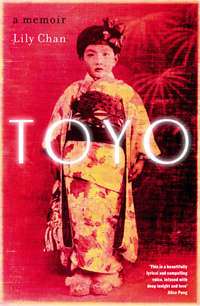
2010
Lily Chan for her memoir Toyo
Blending the intimacy of memoir with an artist’s vision, Toyo is the story of a remarkable woman, a vivid picture of Japan before and after war, and an unpredictable tale of courage and change in today’s Australia… In Toyo, Lily Chan has pieced together the unconventional shape of her grandmother’s story. Vibrant and ultimately heart-rending, Toyo is the chronicle of an extraordinary life, infused with a granddaughter’s love.
Lily Chan is a writer, lawyer and artist. Chan was born in Kyoto, and then moved with her family to Western Australia as a child, where she grew up in Narrogin. She now lives in Melbourne. Chan’s debut work Toyo is a memoir about her grandmother. Following traditional Chinese and Japanese customs, Chan grew up in the same house as her Grandmother. This physical closeness only encouraged Chan’s curiosity. Speaking to Emily Handley for the Byron Bay Writers’ Festival Chan said of her grandmother: “She was like an empress in our house. She’s a natural story teller and her background was full of secrets.” Chan’s Toyo project had a notably long gestation; worried that her grandmother’s fascinating tales would be forgotten if they weren’t written down, she began writing the story at primary school when she was ten years old. Her passion for the project followed her into her teens and adulthood, culminating in the 2012 publication of Toyo. Chan’s narrative offers the reader a vivid portrait of pre- and post-war Japan, as well as a picture of modern-day Australia. The judges commented on Chan’s work: “Beautifully written, evocative and memorable, this is a piece of writing by a young writer with a fresh voice that holds out the promise of a career in which great things may be achieved.” Chan went on to win the 2013 Dobbie Literary Award for Toyo.
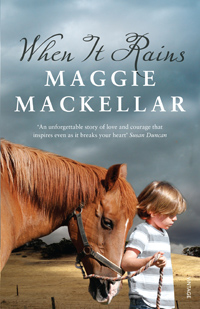
2009
Maggie Mackellar for When It Rains: A Memoir
Maggie Mackellar is a writer and academic historian. Her manuscript Anatomy of Grief was published in 2010 under the revised title When It Rains: A Memoir. The judges praised Mackellar’s work for its “original and compelling voice,” which “provides a meditation on grief and loss, and on the seasonal rhythms of death and renewal. Writing about the death of her husband and mother, Mackellar conveys the intensity of her personal experiences in such a way that they resonate universally. This work is an examination of the resilience of the human spirit across the ages when faced with the unimaginable.” When It Rains was shortlisted for The Age Book of the Year Award in the Non-Fiction category, and the Queensland Premier’s Literary Awards for Best Non-Fiction Book. An extract from the book titled “Grief and Desire” was published in Meanjin (Spring Vol. 68, No.3 2009). Prior to writing When It Rains, MacKellar held a lecturing position in history at the University of Sydney. In collaboration with Drusilla Modjeska, she edited the critical anthology Core of My Heart, My Country which was published in 2004 by Melbourne University Press. She has also edited Strangers in a Foreign Land: The Journal of Niel Black and Other Voices from the Western District (Miegunyah Press, 2008), which reproduces in full the colonial journal of Niel Black.
2008
Prize shared between Andrew Lindsay for The God of Morphine, and Dmetri Kakmi for Mother Land
Andrew Lindsay’s creative output has been highly varied: he has worked as a journalist, creative writer, poet, actor, musician and composer. Lindsay started his writing career working as a cadet for the National Times; however he promptly turned his attention to acting and theatre, moving to Paris to study at the Jacques Lecoq Theatre School. When he returned to Australia in 1982 he collaborated with Nicoletta Boris to found the Red Weather theatre company in Sydney. Within this theatre company, Lindsay worked as both actor and writer. The 1990s saw Lindsay move to Melbourne and immerse himself in writing. Lindsay has since published two novels – The Breadmaker’s Carnival (Allen & Unwin, 1998) and The Slapping Man (Allen & Unwin, 2003) - as well as a selection of writing from his work-in-progressThe God of Morphine, which was paired with a selection of work by painter Anthony Pelchen in a project titled Difficult Majesty (2011). The Breadmaker’s Carnival won the 1996 Jim Hamilton Award and The Slapping Man was shortlisted for the Fellowship of Australian Writers (FAW) Christina Stead Award. Lindsay has also written the manuscript for a fourth novel, Manly, which was shortlisted for the 2012 CAL Scribe Fiction Prize. A number of Lindsay’s shorter works have appeared in such places as The Weekend Australian, Meanjin and the arts journal extempore. Lindsay has also actively written about his local Melbourne community; he has published articles on Northcote’s live music scene, collated and edited the book Wrestling with an Octopus: Stories from the Collingwood Housing Estates (1992), and worked with photographer Ari Hatzis to put together an annotated photographic monograph titled When Fish Have Feathers: Portraits of Collingwood’s Older Men (2002). Lindsay is also a jazz enthusiast and has published reviews for australianjazz.net.
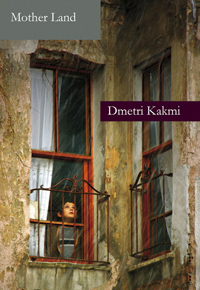
Mother Land is the story of a boy’s love for his homeland, and of a childhood marked by the hostility between two cultures. Kakmi’s memoir offers a vivid portrayal of Greek-Turkish life on the Aegean island of Bozcaada, in all its beauty, poverty, and ignorance. At the age of eight, Dimitri is forced to confront the political realities that spell the end for the Greeks of Anatolia. Nature and his parents’ volatile marriage are his only teachers as he tries to make sense of his changing world.
Dmetri Kakmi is an essayist and critic who has previously worked as a senior editor at Penguin Books. Kakmi was born in Turkey to Greek parents. In 1971, when Kakmi was 10, his family moved to Australia. His memoir Motherland, published by Giramondo in 2008, details his return, after a 28-year absence, to the island of Tenedos (known as Bozcaada in Turkish). In her review of Mother Land written for Media Culture Australia Danielle Mulholland wrote: “Kakmi has captured not only the brutality of a childhood that shaped his actions, but also dwells on the nostalgic memories that eventually lure him back to his Mother Land. In a superbly crafted ending, Kakmi endeavours to make peace with himself and comes to realise that his childhood has blurred the lines between Greek and Turk, he is not either, but a combination of both.” Motherland was shortlisted for the Douglas Stewart Prize for Non-Fiction in the 2008 New South Wales Premier’s Literary Awards. Dmetri has published widely in a number of formats including essays, short fiction, poetry, autobiographical pieces and book reviews in newsprint and journals such as The Age, The Sydney Morning Herald, Kill Your Darlings and Heat. Kakmi also compiled and edited a children’s anthology titled When We Were Young (Viking, 2007) which features a collection of true stories, poems and comics about the childhood adventures and mishaps of a number of prominent children’s authors such as Ursula Dubosarsky, Paul Jennings and Sonya Hartnett. Most recently Kakmi has published an autobiographical essay “Night of the Living Wog” in the anthology Joyful Strains: Making Australia Home (Affirm Press, 2013). His short story “The Boy by the Gate” was published in December 2013 in the collection The New Gothic (Stone Skin Press).
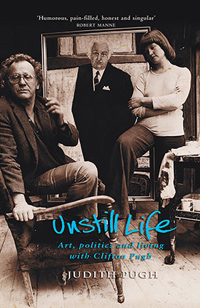
2007
Judith Pugh for Unstill Life: Art, politics and living with Clifton Pugh
Judith Pugh's account of living with the painter Clifton Pugh, and of the art scene in which they moved during the 1970s, encompasses the larger cultural politics of the period interwoven with an intimate and nuanced analysis of the troubles her husband carried with him from his experiences in the Second World War. The judges noted that Pugh imbued the story with "remarkable psychological depth and control of tone," stating that Pugh's "eloquent yet sparse prose provides an arresting portrait of a public figure and a compelling private story." The manuscript In My Seventies was published by Allen & Unwin in 2008 under the revised title Unstill Life: Art, Politics and Living with Clifton Pugh. In addition to her biography Unstill Life, Pugh's creative output has been very diverse: she produced a picture book called Wombalong with Clifton Pugh in 1985, has written lyrics for a song, "The Night of the Moonflower", composed by Philip Nunn, worked together with Eileen Chanin and Steven Miller to collate Degenerates and Perverts: The 1939 Herald Exhibition of French and British Contemporary Art (University of Melbourne Press, 2005), has contributed an essay to La Trobe Essays (Black Inc., 2006), published poetry in The Weekend Australian (2009), and collaborated with Malcom R. Beazely to produce an anthology of poetry: There's Something About a Rose (2010). She also runs a virtual art gallery and is in the process of completing a PhD in politics at La Trobe University, where she is researching the history of the Historic Memorials Committee and the Commonwealth Art Advisory Board.
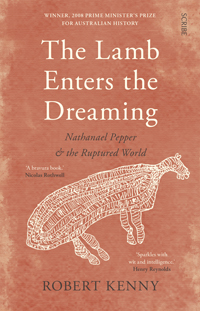
2006
Robert Kenny for The Lamb Enters the Dreaming: Nathanael Pepper & the Ruptured World
The Lamb Enters the Dreaming traces the life of Nathanael Pepper of the Wotjobaluk people, who was born as the first pastoralists were driving cattle and sheep into Victoria’s Wimmera region... Brilliantly original in conception, and written with a rare lucidity and lightness of touch, The Lamb Enters the Dreaming is a detailed and sensitive exploration of a life, a meditation on the matter of culture and conversion, and a major reappraisal of the relations between Aboriginal and European societies in the first decades of contact in southern Australia.
Robert Kenny’s acclaimed meditation on Australian colonial history, The Lamb Enters the Dreaming: Nathanael Pepper & the Ruptured World, won the 2008 Prime Minister’s Prize for Australian History, the 2008 Australian Historical Association’s W.K. Hancock prize and the 2008 Victorian Premier’s Prize for First Book of History. Melbourne academic Peter Botsman described Kenny’s work as “exceptional, a major contribution that takes us to the precipice of understanding several dimensions of the 219-year relationship between Indigenous and non-Indigenous Australians.” Prior to turning his attention to history, Kenny was an active member of the Australian poetry scene as both a writer and publisher. In particular he was a member of the ‘Generation of 68’ poets and the experimental poetry scene which developed around La Mama theatre in Melbourne. In the 1970s he collaborated with Michael Dugan and Phillip Edmonds to launch Contempa Publications and the periodical Contempa, which promoted and published poetry and prose. His own poetry appeared in a number of publications including Australian Poetry Now (Sun Books, 1970). His debut poetry collection Dead Oceans Poems was published in 1975 (Rigmarole of the Hours) and was followed by Poem (Ragman, 1975); Etcetera (Ragman, 1978); Dark Lyrics (Edition 200, 1987) and The Winter Bridge (Eaglemont, 1993). Throughout the 1970s and 80s he experimented with genre fiction, producing works of crime and detective fiction. Kenny currently works as a Postdoctoral Fellow in the School of Humanities at La Trobe University. His research interests revolve around the social history of ideas and the relationship between religion and science. This year, in 2013, he published an autobiographical work Gardens of Fire (UWA, 2013) in which he recounts his experience of the 2009 Black Saturday bushfires alongside a broader social history of fire.
2005
Jennifer Compton for Who Doesn’t Want Me to Dance
Jennifer Compton was born in New Zealand. From the early 1970s onward Compton was involved in the performing arts scene in both New Zealand and Australia, working variously as a playwright, actress and stage manager. During her time in Sydney, she participated in the Playwright’s Studio at the National Institute of Dramatic Art (NIDA). While there she wrote the highly acclaimed play Crossfire, which was first performed at Sydney’s Nimrod Theatre in 1975 under the alternate title No Man’s Land. In 1983 she relocated permanently to Australia. Compton has since written a number of plays including The Big Picture (Currency Press, 1999) and the one act play Barefoot (Currency Press, 1994) and the radio plays Julia’s Song (1991), Wingello Road (1987), and Conversations (1984). More recently her creative focus has shifted towards poetry and prose. Her poetry has been published in The Canberra Times and a number of journals and collections including Going Down Swinging, Best Australian Poems, Quadrant, Westerly, Overland and the online magazine Gangway. She has also published multiple books of poetry including Ungainly (Mulla Mulla Press, 2012), This City (Otago Press, 2011), Barefoot (Picaro Press, 2010), Parker and Quink (Ginninderra Press, 2004) and Blue (Ginninderra Press, 2000). Her essay “The Magic Teaspoon” was also included in Best Australian Essays 2012. She was recently awarded the 2013 Newcastle Poetry Prize for her poem “Now You Shall Know.”
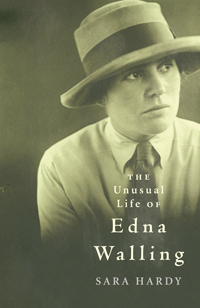
2004
Sara Hardy for her biography The Unusual Life of Edna Walling
Sara Hardy is an English-born Australian writer and performer whose works have been staged in the UK, USA, Canada and Australia. Hardy’s interest in Edna Walling - a landscape designer who had a fundamental influence on the appearance of Australian gardens - grew out of a performance project. “I was first introduced to Edna Walling when I was an actor” said Hardy. “I took the role of Edna in an outdoor play called Edna for the Garden in 1989 and was intrigued and somewhat mystified by the paucity of information about her personal life. As the years passed and there was still no in-depth biography of this remarkable and unconventional woman, I decided to do some research for myself.” The Unusual Life of Edna Walling was published in April 2005 by Allen & Unwin. Hardy went on to write a second biography titled Dame Joan Hammond: Love & Music (Allen & Unwin, 2008). She is also the author of the plays Queer Fruit (1998), Oddly Lunchbox (1997), Virtually Ethel (1996), She of the Electrolux. Or a Vacuum in a Room of One’s Own (1995), Kindred Spirits (1992), Vita! – A Fantasy (1991), Radclyffe (1987), and Who Knows (1979). Hardy has also published monologues, short stories and poems, which have appeared in a variety of periodicals and anthologies including Stet, The Naked Pomegranate, Second Degree Tampering (Sybylla Press, 1992) and Heroines (Penguin, 1991).